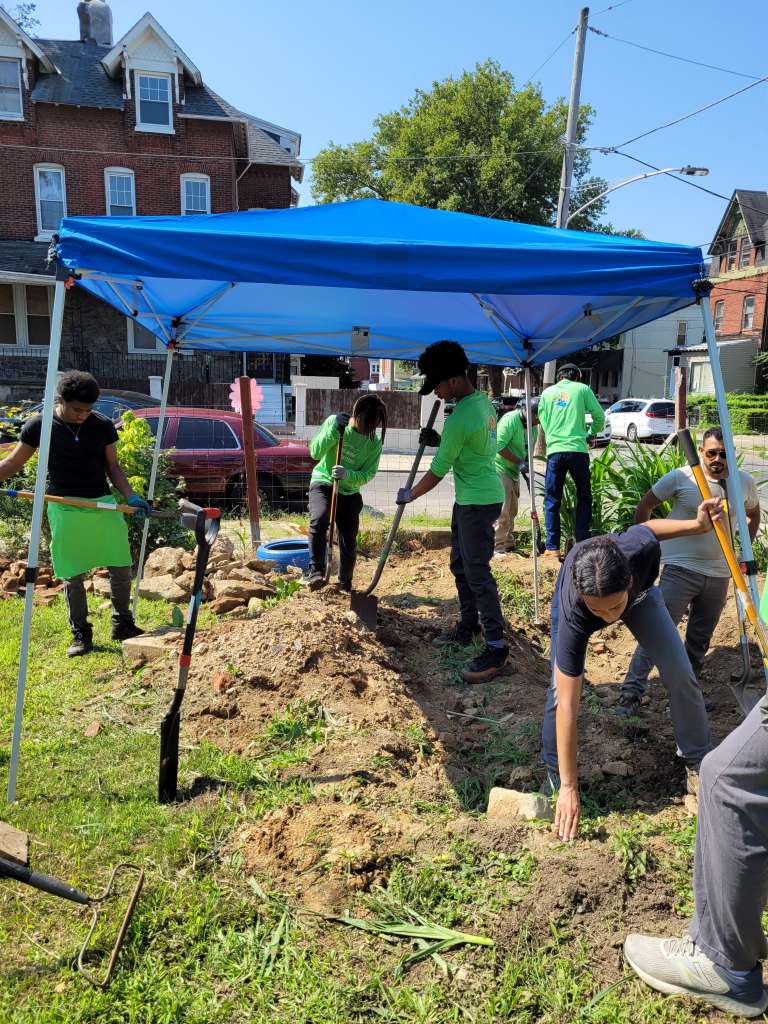
This growing season, NGT expanded its partnership with John Heinz National Wildlife Refuge and the Audubon Society to bring hands-on technical support, education, and native plants to create new pollinator gardens at the Five Loaves Two Fish and Viola Street Community Gardens.
These exciting initiatives build off the successful pollinator planting work that took place with the NGT-protected Pentridge Children’s Garden, and Chester Ave Community Garden over the past few summers.
The Pollinator Network Project is a collaborative effort with local partners and community groups, funded by the National Fish and Wildlife Foundation to create and support 50 native pollinator gardens across west and southwest Philadelphia. These community gardens support urban biodiversity and add natural beauty to neighborhoods, giving people more access to nature and healthy green spaces. As pollinator gardens, they also offer essential resources that insects and birds need to survive such as food and shelter. Careful planning is essential to creating a successful pollinator garden.
Before the projects began, John Heinz and Audubon staff met with garden leaders at the Five Loaves Two Fish and Viola Street Community Gardens to determine what was best for each garden. Over the course of the season, the team spent long days clearing areas and using a mix of pollinator flowers to design welcoming and beneficial spaces.
NGT can provide critical assurance to the Pollinator Network partners that land access at these gardens is secure, so that the hard work and investment they are making into the development of these gardens will be preserved for the long term. Carmelita Rosner, Community Engagement Specialist with John Heinz shared, “It’s always exciting to learn of a new (to us) garden and meet the folks behind them. One of the highlights for John Heinz NWR at Tinicum is the depth of relationship that grows from a sustained partnership over the years. That length of time and depth of relationship means we can get creative and organize fun community-first events at the gardens, have honest conversations to make sustainable improvements, and see the garden and its people change throughout the seasons.”
The Pollinator Network initiative also includes an essential youth development component. The partners want youth to recognize they are the next generation of stewards and have the power to make change. This is supported by the Park Ambassador (PA) program, adopted as part of the Pollinator Network initiative, and developed in conjunction with Thomas Jefferson’s Park in a Truck initiative. Local high school students work as Park Ambassadors, learning how to be advocates, educators, managers and liaisons for the pollinator gardens being installed throughout Philadelphia. Young ambassadors from Belmont Charter High School are not only given jobs, but responsibilities to look after neighborhood gardens and parks.
The partner organizations also want the youth to be civically engaged in the process and to continue to support and advocate for healthier and more diverse environments in urban areas. They would like to see the youth gain an appreciation not only for nature, but their communities overall and to become leaders.
When working at the Five Loaves Garden, one youth member who was asked why they wanted to be part of the Park Ambassador said, “I wanted to be part of the program because I want my neighbors to understand how important pollinators are to grow healthy food. Before this program I really did not understand the role pollination played in growing food.”
“Community gardens combine the best of both worlds: people and nature. They’re not antithetical to each other, contradictory, or incompatible. Instead, community gardens show how much people want to be part of, and are part of, nature, even in a city as concrete scaped as Philadelphia, community gardens flourish! Philly’s community gardens provide a place for folks to nurture their inherent connection with nature and neighbors,” said Skye Glover, Audubon Society.
Through its funded opportunities and beyond, John Heinz (and partners) will continue to support pollinator gardens through supplementary beds, planning support, and programming.
NGT looks forward to continuing to work with these organizations to bring more of our protected gardens into the Pollinator Network to build more environmentally sustainable communities throughout Philadelphia.
